Exploring Organisational Behaviour: Hays Travels Case Study Analysis
VerifiedAdded on 2023/06/17
|18
|5035
|485
Report
AI Summary
This report provides an analysis of organisational behaviour within Hays Travels, a prominent travel agent in the UK, focusing on the impact of organisational culture, power, and politics on individual and team performance. It explores various motivational theories, including Maslow's hierarchy of needs and Herzberg's two-factor theory, and their application in enhancing employee motivation and achieving organisational goals. The report also examines the characteristics of effective and ineffective teams, supported by relevant team and group development theories. Furthermore, it evaluates a range of organisational behaviour concepts and philosophies and their influence on behaviour in both positive and negative ways within the workplace, highlighting the importance of understanding these dynamics for organisational success. The analysis emphasizes how Hays Travels can leverage these insights to improve employee performance, team collaboration, and overall business productivity.
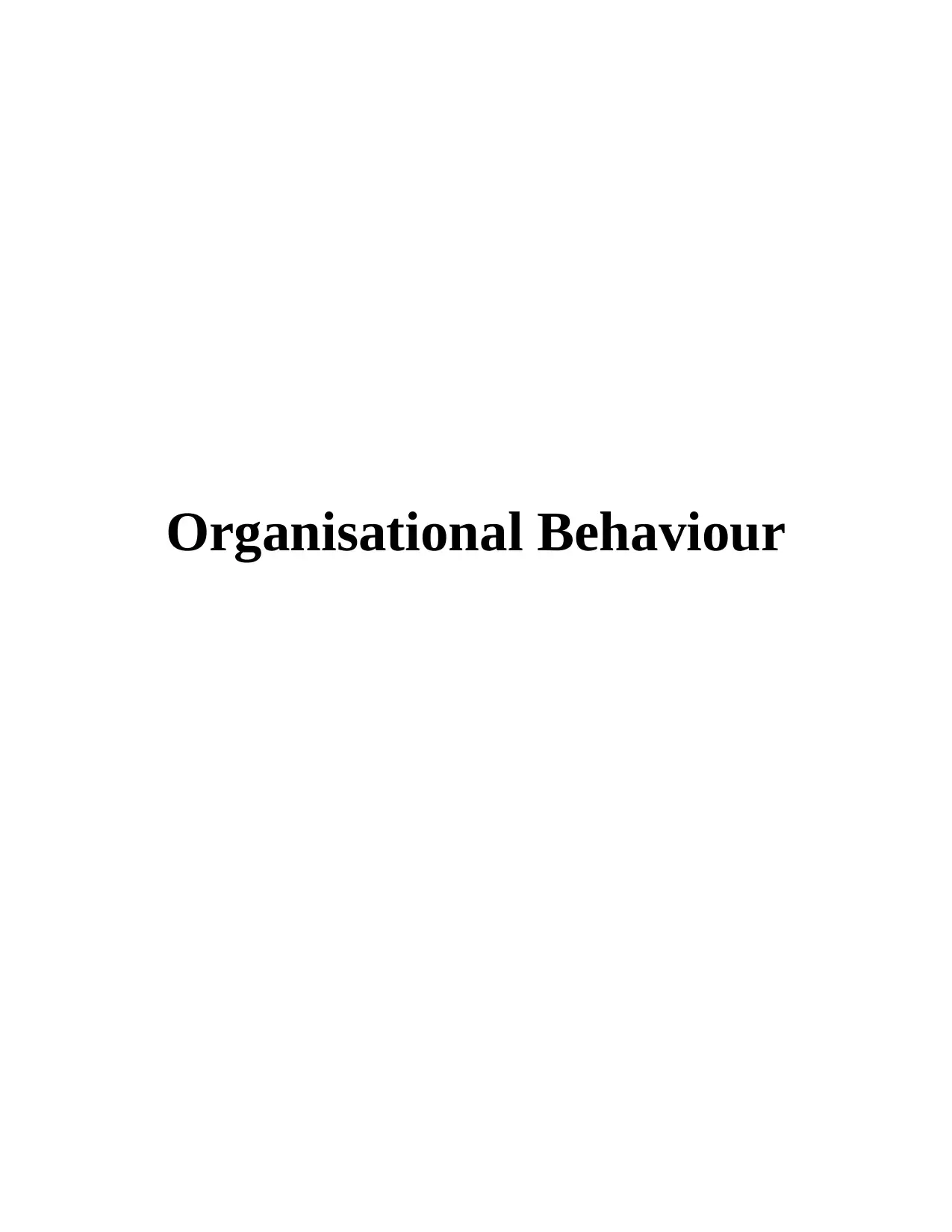
Organisational Behaviour
Paraphrase This Document
Need a fresh take? Get an instant paraphrase of this document with our AI Paraphraser
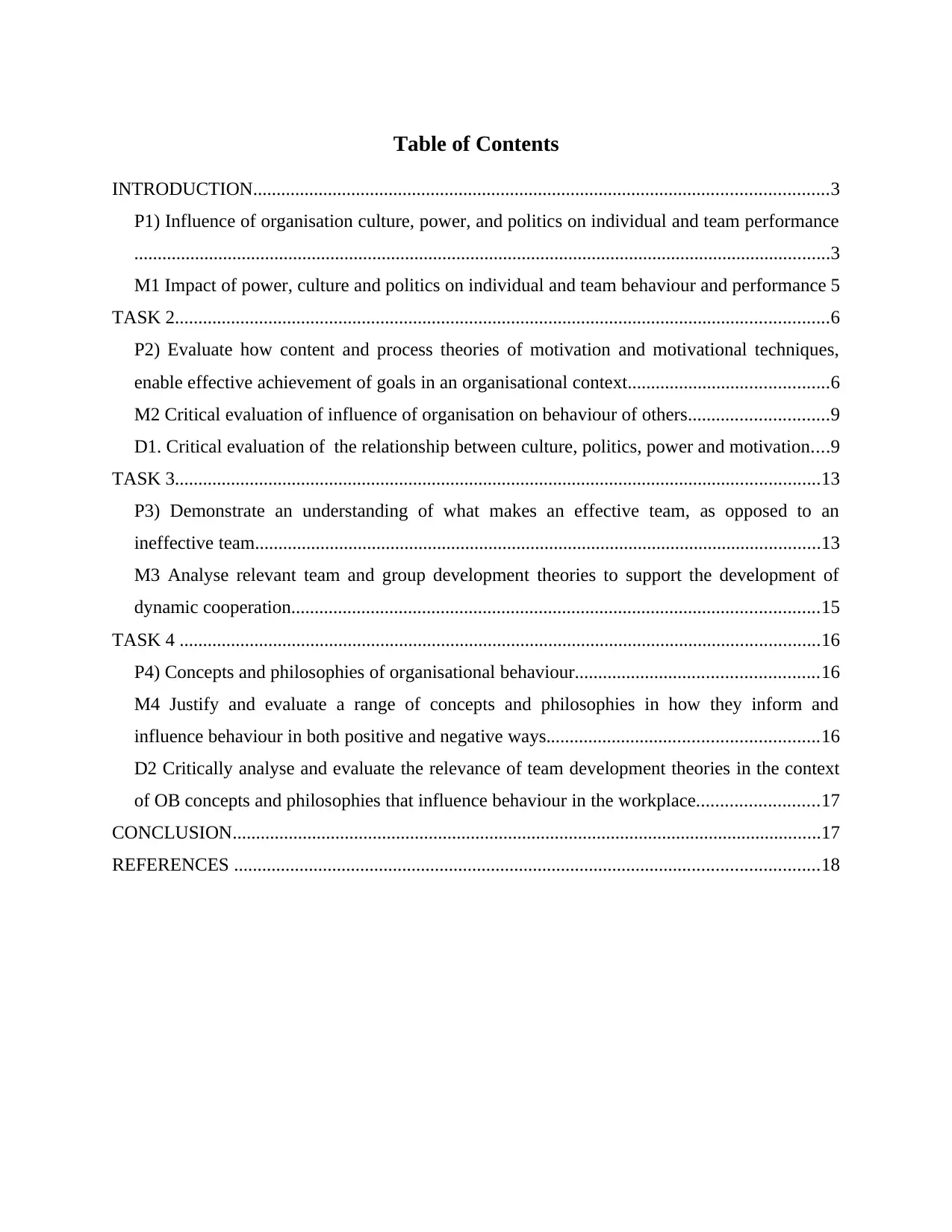
Table of Contents
INTRODUCTION...........................................................................................................................3
P1) Influence of organisation culture, power, and politics on individual and team performance
.....................................................................................................................................................3
M1 Impact of power, culture and politics on individual and team behaviour and performance 5
TASK 2............................................................................................................................................6
P2) Evaluate how content and process theories of motivation and motivational techniques,
enable effective achievement of goals in an organisational context...........................................6
M2 Critical evaluation of influence of organisation on behaviour of others..............................9
D1. Critical evaluation of the relationship between culture, politics, power and motivation....9
TASK 3..........................................................................................................................................13
P3) Demonstrate an understanding of what makes an effective team, as opposed to an
ineffective team.........................................................................................................................13
M3 Analyse relevant team and group development theories to support the development of
dynamic cooperation.................................................................................................................15
TASK 4 .........................................................................................................................................16
P4) Concepts and philosophies of organisational behaviour....................................................16
M4 Justify and evaluate a range of concepts and philosophies in how they inform and
influence behaviour in both positive and negative ways..........................................................16
D2 Critically analyse and evaluate the relevance of team development theories in the context
of OB concepts and philosophies that influence behaviour in the workplace..........................17
CONCLUSION..............................................................................................................................17
REFERENCES .............................................................................................................................18
INTRODUCTION...........................................................................................................................3
P1) Influence of organisation culture, power, and politics on individual and team performance
.....................................................................................................................................................3
M1 Impact of power, culture and politics on individual and team behaviour and performance 5
TASK 2............................................................................................................................................6
P2) Evaluate how content and process theories of motivation and motivational techniques,
enable effective achievement of goals in an organisational context...........................................6
M2 Critical evaluation of influence of organisation on behaviour of others..............................9
D1. Critical evaluation of the relationship between culture, politics, power and motivation....9
TASK 3..........................................................................................................................................13
P3) Demonstrate an understanding of what makes an effective team, as opposed to an
ineffective team.........................................................................................................................13
M3 Analyse relevant team and group development theories to support the development of
dynamic cooperation.................................................................................................................15
TASK 4 .........................................................................................................................................16
P4) Concepts and philosophies of organisational behaviour....................................................16
M4 Justify and evaluate a range of concepts and philosophies in how they inform and
influence behaviour in both positive and negative ways..........................................................16
D2 Critically analyse and evaluate the relevance of team development theories in the context
of OB concepts and philosophies that influence behaviour in the workplace..........................17
CONCLUSION..............................................................................................................................17
REFERENCES .............................................................................................................................18
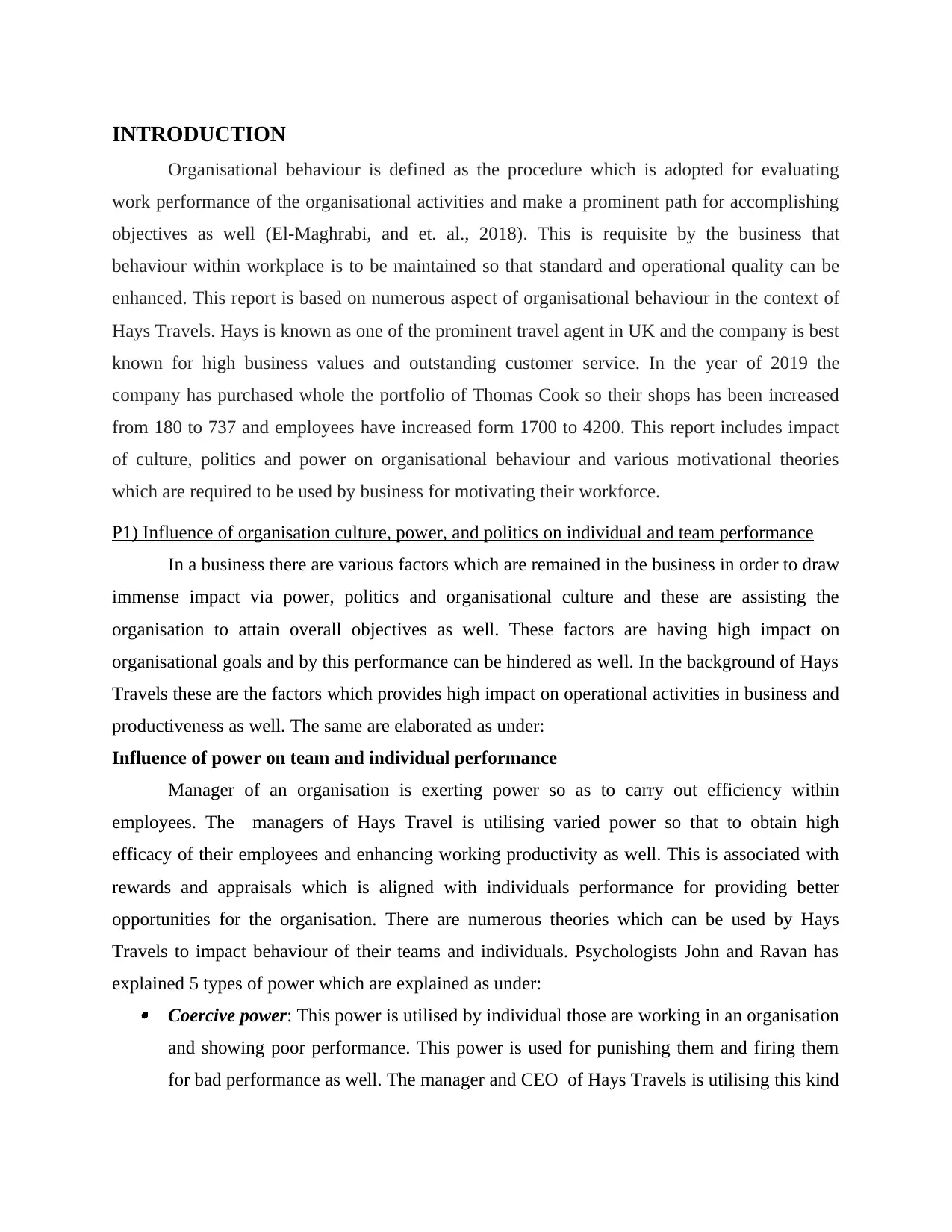
INTRODUCTION
Organisational behaviour is defined as the procedure which is adopted for evaluating
work performance of the organisational activities and make a prominent path for accomplishing
objectives as well (El-Maghrabi, and et. al., 2018). This is requisite by the business that
behaviour within workplace is to be maintained so that standard and operational quality can be
enhanced. This report is based on numerous aspect of organisational behaviour in the context of
Hays Travels. Hays is known as one of the prominent travel agent in UK and the company is best
known for high business values and outstanding customer service. In the year of 2019 the
company has purchased whole the portfolio of Thomas Cook so their shops has been increased
from 180 to 737 and employees have increased form 1700 to 4200. This report includes impact
of culture, politics and power on organisational behaviour and various motivational theories
which are required to be used by business for motivating their workforce.
P1) Influence of organisation culture, power, and politics on individual and team performance
In a business there are various factors which are remained in the business in order to draw
immense impact via power, politics and organisational culture and these are assisting the
organisation to attain overall objectives as well. These factors are having high impact on
organisational goals and by this performance can be hindered as well. In the background of Hays
Travels these are the factors which provides high impact on operational activities in business and
productiveness as well. The same are elaborated as under:
Influence of power on team and individual performance
Manager of an organisation is exerting power so as to carry out efficiency within
employees. The managers of Hays Travel is utilising varied power so that to obtain high
efficacy of their employees and enhancing working productivity as well. This is associated with
rewards and appraisals which is aligned with individuals performance for providing better
opportunities for the organisation. There are numerous theories which can be used by Hays
Travels to impact behaviour of their teams and individuals. Psychologists John and Ravan has
explained 5 types of power which are explained as under: Coercive power: This power is utilised by individual those are working in an organisation
and showing poor performance. This power is used for punishing them and firing them
for bad performance as well. The manager and CEO of Hays Travels is utilising this kind
Organisational behaviour is defined as the procedure which is adopted for evaluating
work performance of the organisational activities and make a prominent path for accomplishing
objectives as well (El-Maghrabi, and et. al., 2018). This is requisite by the business that
behaviour within workplace is to be maintained so that standard and operational quality can be
enhanced. This report is based on numerous aspect of organisational behaviour in the context of
Hays Travels. Hays is known as one of the prominent travel agent in UK and the company is best
known for high business values and outstanding customer service. In the year of 2019 the
company has purchased whole the portfolio of Thomas Cook so their shops has been increased
from 180 to 737 and employees have increased form 1700 to 4200. This report includes impact
of culture, politics and power on organisational behaviour and various motivational theories
which are required to be used by business for motivating their workforce.
P1) Influence of organisation culture, power, and politics on individual and team performance
In a business there are various factors which are remained in the business in order to draw
immense impact via power, politics and organisational culture and these are assisting the
organisation to attain overall objectives as well. These factors are having high impact on
organisational goals and by this performance can be hindered as well. In the background of Hays
Travels these are the factors which provides high impact on operational activities in business and
productiveness as well. The same are elaborated as under:
Influence of power on team and individual performance
Manager of an organisation is exerting power so as to carry out efficiency within
employees. The managers of Hays Travel is utilising varied power so that to obtain high
efficacy of their employees and enhancing working productivity as well. This is associated with
rewards and appraisals which is aligned with individuals performance for providing better
opportunities for the organisation. There are numerous theories which can be used by Hays
Travels to impact behaviour of their teams and individuals. Psychologists John and Ravan has
explained 5 types of power which are explained as under: Coercive power: This power is utilised by individual those are working in an organisation
and showing poor performance. This power is used for punishing them and firing them
for bad performance as well. The manager and CEO of Hays Travels is utilising this kind
⊘ This is a preview!⊘
Do you want full access?
Subscribe today to unlock all pages.

Trusted by 1+ million students worldwide
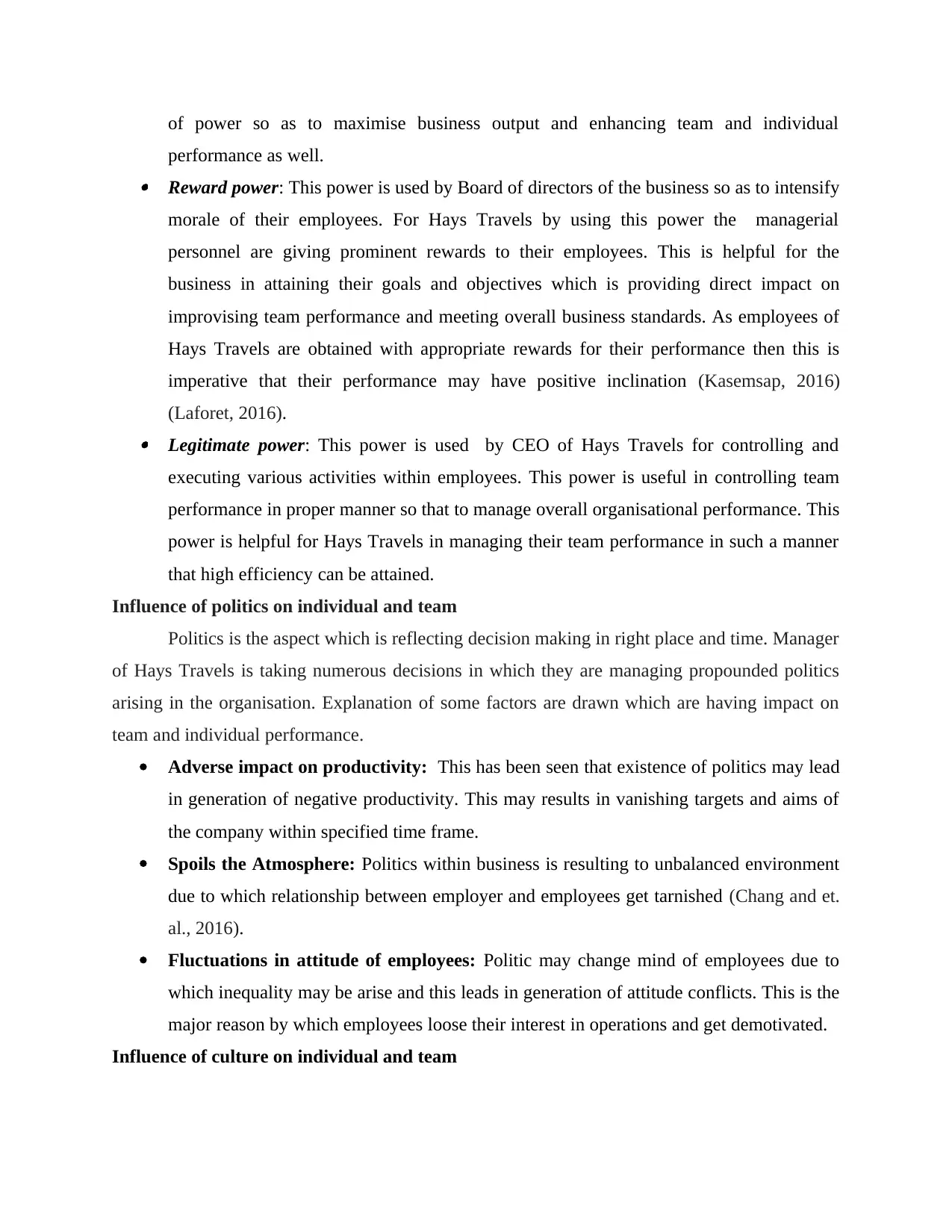
of power so as to maximise business output and enhancing team and individual
performance as well. Reward power: This power is used by Board of directors of the business so as to intensify
morale of their employees. For Hays Travels by using this power the managerial
personnel are giving prominent rewards to their employees. This is helpful for the
business in attaining their goals and objectives which is providing direct impact on
improvising team performance and meeting overall business standards. As employees of
Hays Travels are obtained with appropriate rewards for their performance then this is
imperative that their performance may have positive inclination (Kasemsap, 2016)
(Laforet, 2016). Legitimate power: This power is used by CEO of Hays Travels for controlling and
executing various activities within employees. This power is useful in controlling team
performance in proper manner so that to manage overall organisational performance. This
power is helpful for Hays Travels in managing their team performance in such a manner
that high efficiency can be attained.
Influence of politics on individual and team
Politics is the aspect which is reflecting decision making in right place and time. Manager
of Hays Travels is taking numerous decisions in which they are managing propounded politics
arising in the organisation. Explanation of some factors are drawn which are having impact on
team and individual performance.
Adverse impact on productivity: This has been seen that existence of politics may lead
in generation of negative productivity. This may results in vanishing targets and aims of
the company within specified time frame.
Spoils the Atmosphere: Politics within business is resulting to unbalanced environment
due to which relationship between employer and employees get tarnished (Chang and et.
al., 2016).
Fluctuations in attitude of employees: Politic may change mind of employees due to
which inequality may be arise and this leads in generation of attitude conflicts. This is the
major reason by which employees loose their interest in operations and get demotivated.
Influence of culture on individual and team
performance as well. Reward power: This power is used by Board of directors of the business so as to intensify
morale of their employees. For Hays Travels by using this power the managerial
personnel are giving prominent rewards to their employees. This is helpful for the
business in attaining their goals and objectives which is providing direct impact on
improvising team performance and meeting overall business standards. As employees of
Hays Travels are obtained with appropriate rewards for their performance then this is
imperative that their performance may have positive inclination (Kasemsap, 2016)
(Laforet, 2016). Legitimate power: This power is used by CEO of Hays Travels for controlling and
executing various activities within employees. This power is useful in controlling team
performance in proper manner so that to manage overall organisational performance. This
power is helpful for Hays Travels in managing their team performance in such a manner
that high efficiency can be attained.
Influence of politics on individual and team
Politics is the aspect which is reflecting decision making in right place and time. Manager
of Hays Travels is taking numerous decisions in which they are managing propounded politics
arising in the organisation. Explanation of some factors are drawn which are having impact on
team and individual performance.
Adverse impact on productivity: This has been seen that existence of politics may lead
in generation of negative productivity. This may results in vanishing targets and aims of
the company within specified time frame.
Spoils the Atmosphere: Politics within business is resulting to unbalanced environment
due to which relationship between employer and employees get tarnished (Chang and et.
al., 2016).
Fluctuations in attitude of employees: Politic may change mind of employees due to
which inequality may be arise and this leads in generation of attitude conflicts. This is the
major reason by which employees loose their interest in operations and get demotivated.
Influence of culture on individual and team
Paraphrase This Document
Need a fresh take? Get an instant paraphrase of this document with our AI Paraphraser
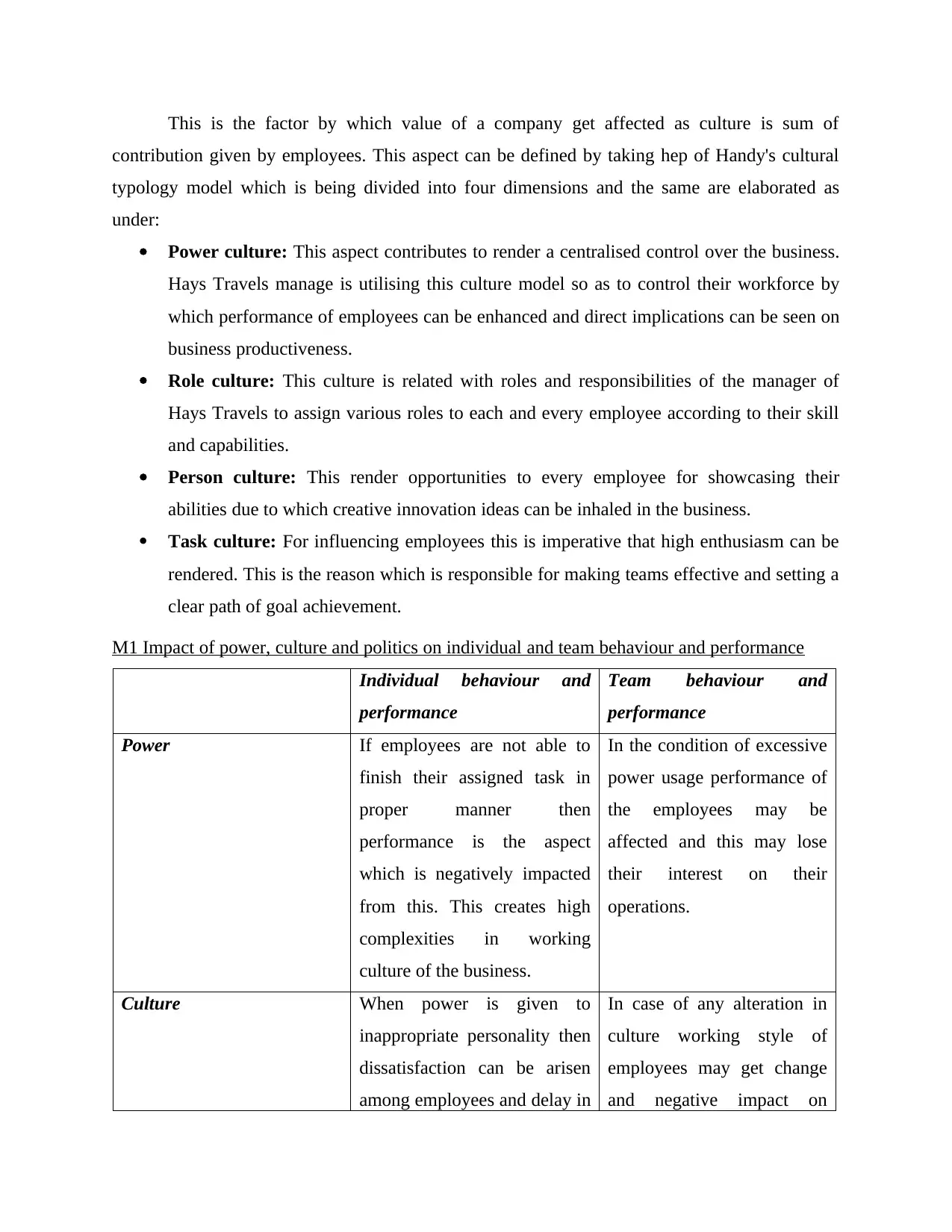
This is the factor by which value of a company get affected as culture is sum of
contribution given by employees. This aspect can be defined by taking hep of Handy's cultural
typology model which is being divided into four dimensions and the same are elaborated as
under:
Power culture: This aspect contributes to render a centralised control over the business.
Hays Travels manage is utilising this culture model so as to control their workforce by
which performance of employees can be enhanced and direct implications can be seen on
business productiveness.
Role culture: This culture is related with roles and responsibilities of the manager of
Hays Travels to assign various roles to each and every employee according to their skill
and capabilities.
Person culture: This render opportunities to every employee for showcasing their
abilities due to which creative innovation ideas can be inhaled in the business.
Task culture: For influencing employees this is imperative that high enthusiasm can be
rendered. This is the reason which is responsible for making teams effective and setting a
clear path of goal achievement.
M1 Impact of power, culture and politics on individual and team behaviour and performance
Individual behaviour and
performance
Team behaviour and
performance
Power If employees are not able to
finish their assigned task in
proper manner then
performance is the aspect
which is negatively impacted
from this. This creates high
complexities in working
culture of the business.
In the condition of excessive
power usage performance of
the employees may be
affected and this may lose
their interest on their
operations.
Culture When power is given to
inappropriate personality then
dissatisfaction can be arisen
among employees and delay in
In case of any alteration in
culture working style of
employees may get change
and negative impact on
contribution given by employees. This aspect can be defined by taking hep of Handy's cultural
typology model which is being divided into four dimensions and the same are elaborated as
under:
Power culture: This aspect contributes to render a centralised control over the business.
Hays Travels manage is utilising this culture model so as to control their workforce by
which performance of employees can be enhanced and direct implications can be seen on
business productiveness.
Role culture: This culture is related with roles and responsibilities of the manager of
Hays Travels to assign various roles to each and every employee according to their skill
and capabilities.
Person culture: This render opportunities to every employee for showcasing their
abilities due to which creative innovation ideas can be inhaled in the business.
Task culture: For influencing employees this is imperative that high enthusiasm can be
rendered. This is the reason which is responsible for making teams effective and setting a
clear path of goal achievement.
M1 Impact of power, culture and politics on individual and team behaviour and performance
Individual behaviour and
performance
Team behaviour and
performance
Power If employees are not able to
finish their assigned task in
proper manner then
performance is the aspect
which is negatively impacted
from this. This creates high
complexities in working
culture of the business.
In the condition of excessive
power usage performance of
the employees may be
affected and this may lose
their interest on their
operations.
Culture When power is given to
inappropriate personality then
dissatisfaction can be arisen
among employees and delay in
In case of any alteration in
culture working style of
employees may get change
and negative impact on
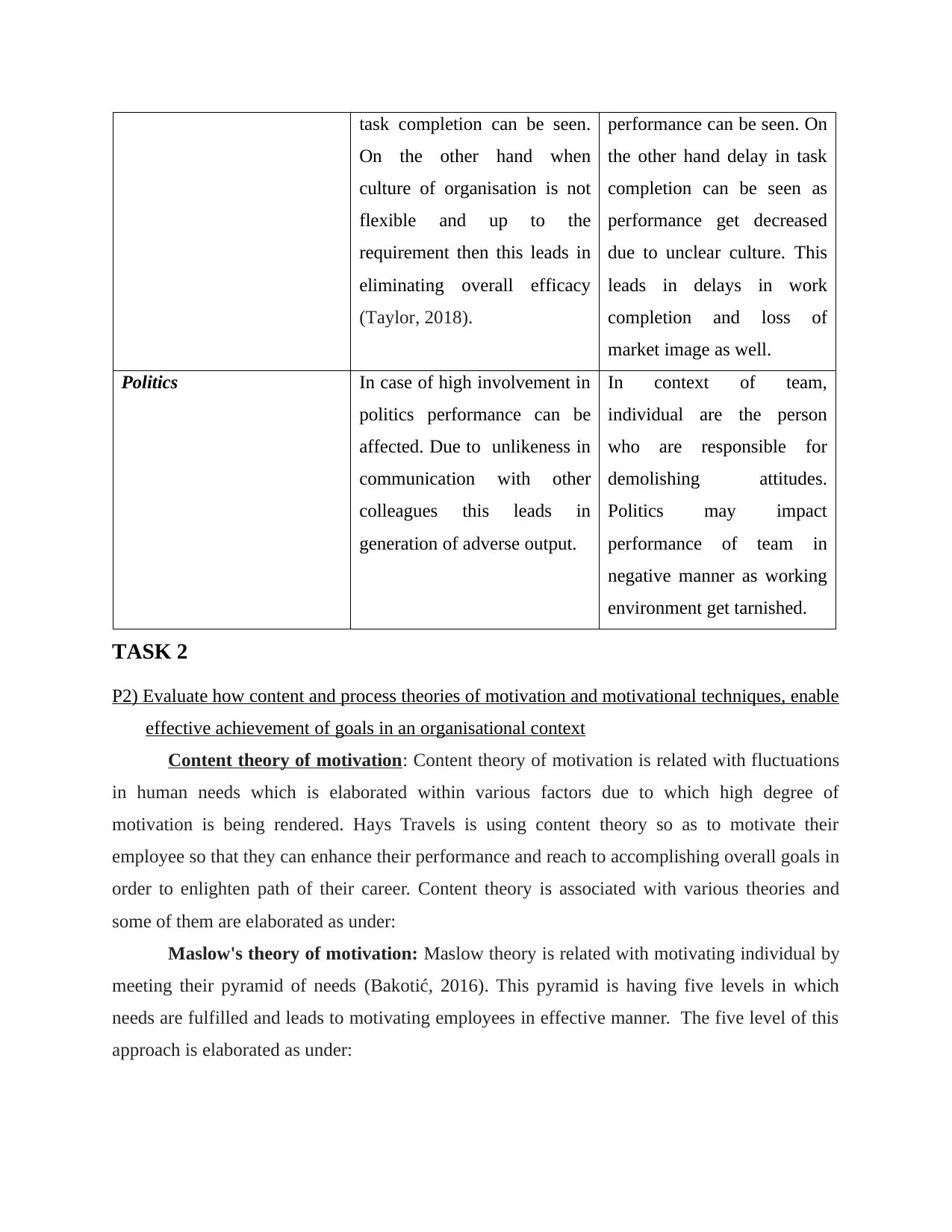
task completion can be seen.
On the other hand when
culture of organisation is not
flexible and up to the
requirement then this leads in
eliminating overall efficacy
(Taylor, 2018).
performance can be seen. On
the other hand delay in task
completion can be seen as
performance get decreased
due to unclear culture. This
leads in delays in work
completion and loss of
market image as well.
Politics In case of high involvement in
politics performance can be
affected. Due to unlikeness in
communication with other
colleagues this leads in
generation of adverse output.
In context of team,
individual are the person
who are responsible for
demolishing attitudes.
Politics may impact
performance of team in
negative manner as working
environment get tarnished.
TASK 2
P2) Evaluate how content and process theories of motivation and motivational techniques, enable
effective achievement of goals in an organisational context
Content theory of motivation: Content theory of motivation is related with fluctuations
in human needs which is elaborated within various factors due to which high degree of
motivation is being rendered. Hays Travels is using content theory so as to motivate their
employee so that they can enhance their performance and reach to accomplishing overall goals in
order to enlighten path of their career. Content theory is associated with various theories and
some of them are elaborated as under:
Maslow's theory of motivation: Maslow theory is related with motivating individual by
meeting their pyramid of needs (Bakotić, 2016). This pyramid is having five levels in which
needs are fulfilled and leads to motivating employees in effective manner. The five level of this
approach is elaborated as under:
On the other hand when
culture of organisation is not
flexible and up to the
requirement then this leads in
eliminating overall efficacy
(Taylor, 2018).
performance can be seen. On
the other hand delay in task
completion can be seen as
performance get decreased
due to unclear culture. This
leads in delays in work
completion and loss of
market image as well.
Politics In case of high involvement in
politics performance can be
affected. Due to unlikeness in
communication with other
colleagues this leads in
generation of adverse output.
In context of team,
individual are the person
who are responsible for
demolishing attitudes.
Politics may impact
performance of team in
negative manner as working
environment get tarnished.
TASK 2
P2) Evaluate how content and process theories of motivation and motivational techniques, enable
effective achievement of goals in an organisational context
Content theory of motivation: Content theory of motivation is related with fluctuations
in human needs which is elaborated within various factors due to which high degree of
motivation is being rendered. Hays Travels is using content theory so as to motivate their
employee so that they can enhance their performance and reach to accomplishing overall goals in
order to enlighten path of their career. Content theory is associated with various theories and
some of them are elaborated as under:
Maslow's theory of motivation: Maslow theory is related with motivating individual by
meeting their pyramid of needs (Bakotić, 2016). This pyramid is having five levels in which
needs are fulfilled and leads to motivating employees in effective manner. The five level of this
approach is elaborated as under:
⊘ This is a preview!⊘
Do you want full access?
Subscribe today to unlock all pages.

Trusted by 1+ million students worldwide
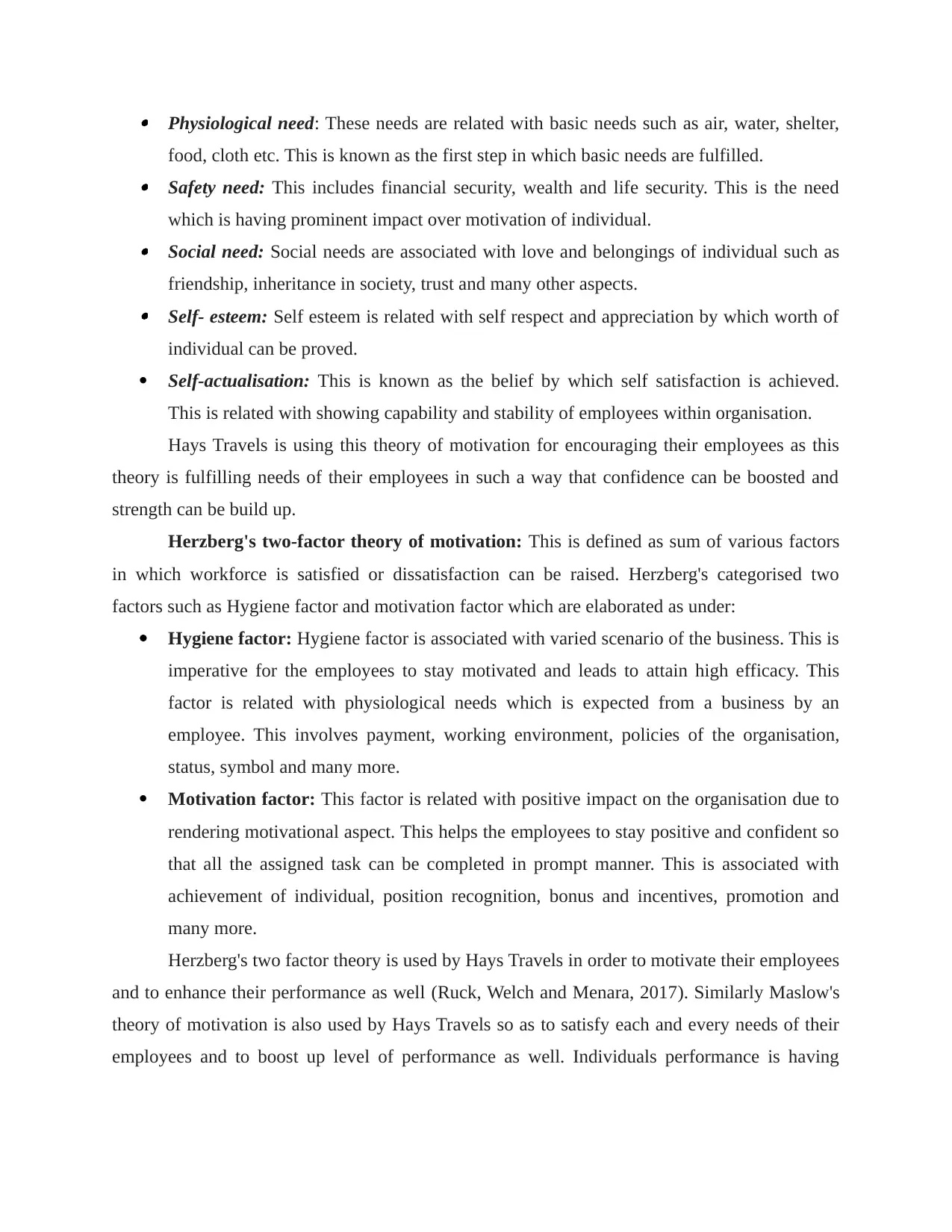
Physiological need: These needs are related with basic needs such as air, water, shelter,
food, cloth etc. This is known as the first step in which basic needs are fulfilled. Safety need: This includes financial security, wealth and life security. This is the need
which is having prominent impact over motivation of individual. Social need: Social needs are associated with love and belongings of individual such as
friendship, inheritance in society, trust and many other aspects. Self- esteem: Self esteem is related with self respect and appreciation by which worth of
individual can be proved.
Self-actualisation: This is known as the belief by which self satisfaction is achieved.
This is related with showing capability and stability of employees within organisation.
Hays Travels is using this theory of motivation for encouraging their employees as this
theory is fulfilling needs of their employees in such a way that confidence can be boosted and
strength can be build up.
Herzberg's two-factor theory of motivation: This is defined as sum of various factors
in which workforce is satisfied or dissatisfaction can be raised. Herzberg's categorised two
factors such as Hygiene factor and motivation factor which are elaborated as under:
Hygiene factor: Hygiene factor is associated with varied scenario of the business. This is
imperative for the employees to stay motivated and leads to attain high efficacy. This
factor is related with physiological needs which is expected from a business by an
employee. This involves payment, working environment, policies of the organisation,
status, symbol and many more.
Motivation factor: This factor is related with positive impact on the organisation due to
rendering motivational aspect. This helps the employees to stay positive and confident so
that all the assigned task can be completed in prompt manner. This is associated with
achievement of individual, position recognition, bonus and incentives, promotion and
many more.
Herzberg's two factor theory is used by Hays Travels in order to motivate their employees
and to enhance their performance as well (Ruck, Welch and Menara, 2017). Similarly Maslow's
theory of motivation is also used by Hays Travels so as to satisfy each and every needs of their
employees and to boost up level of performance as well. Individuals performance is having
food, cloth etc. This is known as the first step in which basic needs are fulfilled. Safety need: This includes financial security, wealth and life security. This is the need
which is having prominent impact over motivation of individual. Social need: Social needs are associated with love and belongings of individual such as
friendship, inheritance in society, trust and many other aspects. Self- esteem: Self esteem is related with self respect and appreciation by which worth of
individual can be proved.
Self-actualisation: This is known as the belief by which self satisfaction is achieved.
This is related with showing capability and stability of employees within organisation.
Hays Travels is using this theory of motivation for encouraging their employees as this
theory is fulfilling needs of their employees in such a way that confidence can be boosted and
strength can be build up.
Herzberg's two-factor theory of motivation: This is defined as sum of various factors
in which workforce is satisfied or dissatisfaction can be raised. Herzberg's categorised two
factors such as Hygiene factor and motivation factor which are elaborated as under:
Hygiene factor: Hygiene factor is associated with varied scenario of the business. This is
imperative for the employees to stay motivated and leads to attain high efficacy. This
factor is related with physiological needs which is expected from a business by an
employee. This involves payment, working environment, policies of the organisation,
status, symbol and many more.
Motivation factor: This factor is related with positive impact on the organisation due to
rendering motivational aspect. This helps the employees to stay positive and confident so
that all the assigned task can be completed in prompt manner. This is associated with
achievement of individual, position recognition, bonus and incentives, promotion and
many more.
Herzberg's two factor theory is used by Hays Travels in order to motivate their employees
and to enhance their performance as well (Ruck, Welch and Menara, 2017). Similarly Maslow's
theory of motivation is also used by Hays Travels so as to satisfy each and every needs of their
employees and to boost up level of performance as well. Individuals performance is having
Paraphrase This Document
Need a fresh take? Get an instant paraphrase of this document with our AI Paraphraser
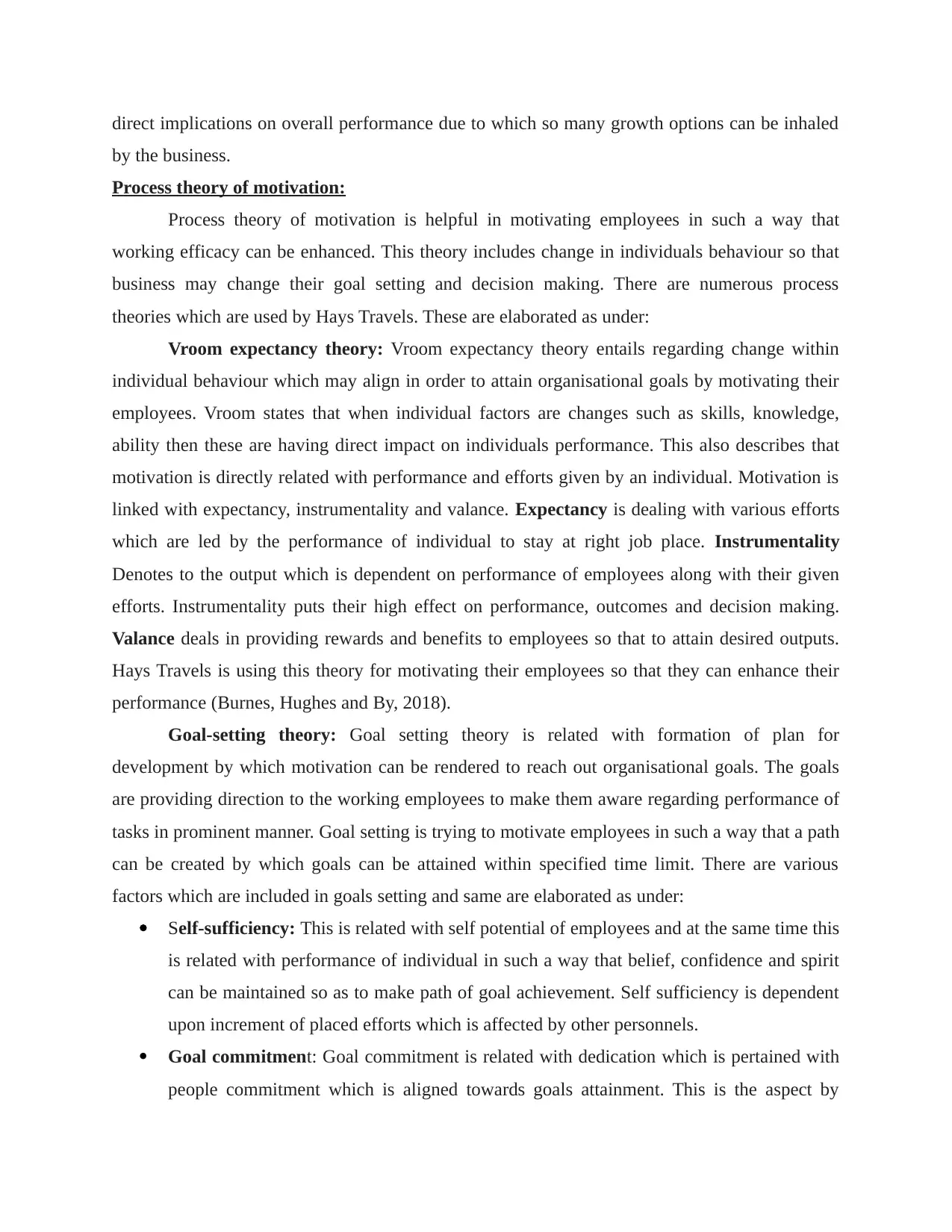
direct implications on overall performance due to which so many growth options can be inhaled
by the business.
Process theory of motivation:
Process theory of motivation is helpful in motivating employees in such a way that
working efficacy can be enhanced. This theory includes change in individuals behaviour so that
business may change their goal setting and decision making. There are numerous process
theories which are used by Hays Travels. These are elaborated as under:
Vroom expectancy theory: Vroom expectancy theory entails regarding change within
individual behaviour which may align in order to attain organisational goals by motivating their
employees. Vroom states that when individual factors are changes such as skills, knowledge,
ability then these are having direct impact on individuals performance. This also describes that
motivation is directly related with performance and efforts given by an individual. Motivation is
linked with expectancy, instrumentality and valance. Expectancy is dealing with various efforts
which are led by the performance of individual to stay at right job place. Instrumentality
Denotes to the output which is dependent on performance of employees along with their given
efforts. Instrumentality puts their high effect on performance, outcomes and decision making.
Valance deals in providing rewards and benefits to employees so that to attain desired outputs.
Hays Travels is using this theory for motivating their employees so that they can enhance their
performance (Burnes, Hughes and By, 2018).
Goal-setting theory: Goal setting theory is related with formation of plan for
development by which motivation can be rendered to reach out organisational goals. The goals
are providing direction to the working employees to make them aware regarding performance of
tasks in prominent manner. Goal setting is trying to motivate employees in such a way that a path
can be created by which goals can be attained within specified time limit. There are various
factors which are included in goals setting and same are elaborated as under:
Self-sufficiency: This is related with self potential of employees and at the same time this
is related with performance of individual in such a way that belief, confidence and spirit
can be maintained so as to make path of goal achievement. Self sufficiency is dependent
upon increment of placed efforts which is affected by other personnels.
Goal commitment: Goal commitment is related with dedication which is pertained with
people commitment which is aligned towards goals attainment. This is the aspect by
by the business.
Process theory of motivation:
Process theory of motivation is helpful in motivating employees in such a way that
working efficacy can be enhanced. This theory includes change in individuals behaviour so that
business may change their goal setting and decision making. There are numerous process
theories which are used by Hays Travels. These are elaborated as under:
Vroom expectancy theory: Vroom expectancy theory entails regarding change within
individual behaviour which may align in order to attain organisational goals by motivating their
employees. Vroom states that when individual factors are changes such as skills, knowledge,
ability then these are having direct impact on individuals performance. This also describes that
motivation is directly related with performance and efforts given by an individual. Motivation is
linked with expectancy, instrumentality and valance. Expectancy is dealing with various efforts
which are led by the performance of individual to stay at right job place. Instrumentality
Denotes to the output which is dependent on performance of employees along with their given
efforts. Instrumentality puts their high effect on performance, outcomes and decision making.
Valance deals in providing rewards and benefits to employees so that to attain desired outputs.
Hays Travels is using this theory for motivating their employees so that they can enhance their
performance (Burnes, Hughes and By, 2018).
Goal-setting theory: Goal setting theory is related with formation of plan for
development by which motivation can be rendered to reach out organisational goals. The goals
are providing direction to the working employees to make them aware regarding performance of
tasks in prominent manner. Goal setting is trying to motivate employees in such a way that a path
can be created by which goals can be attained within specified time limit. There are various
factors which are included in goals setting and same are elaborated as under:
Self-sufficiency: This is related with self potential of employees and at the same time this
is related with performance of individual in such a way that belief, confidence and spirit
can be maintained so as to make path of goal achievement. Self sufficiency is dependent
upon increment of placed efforts which is affected by other personnels.
Goal commitment: Goal commitment is related with dedication which is pertained with
people commitment which is aligned towards goals attainment. This is the aspect by
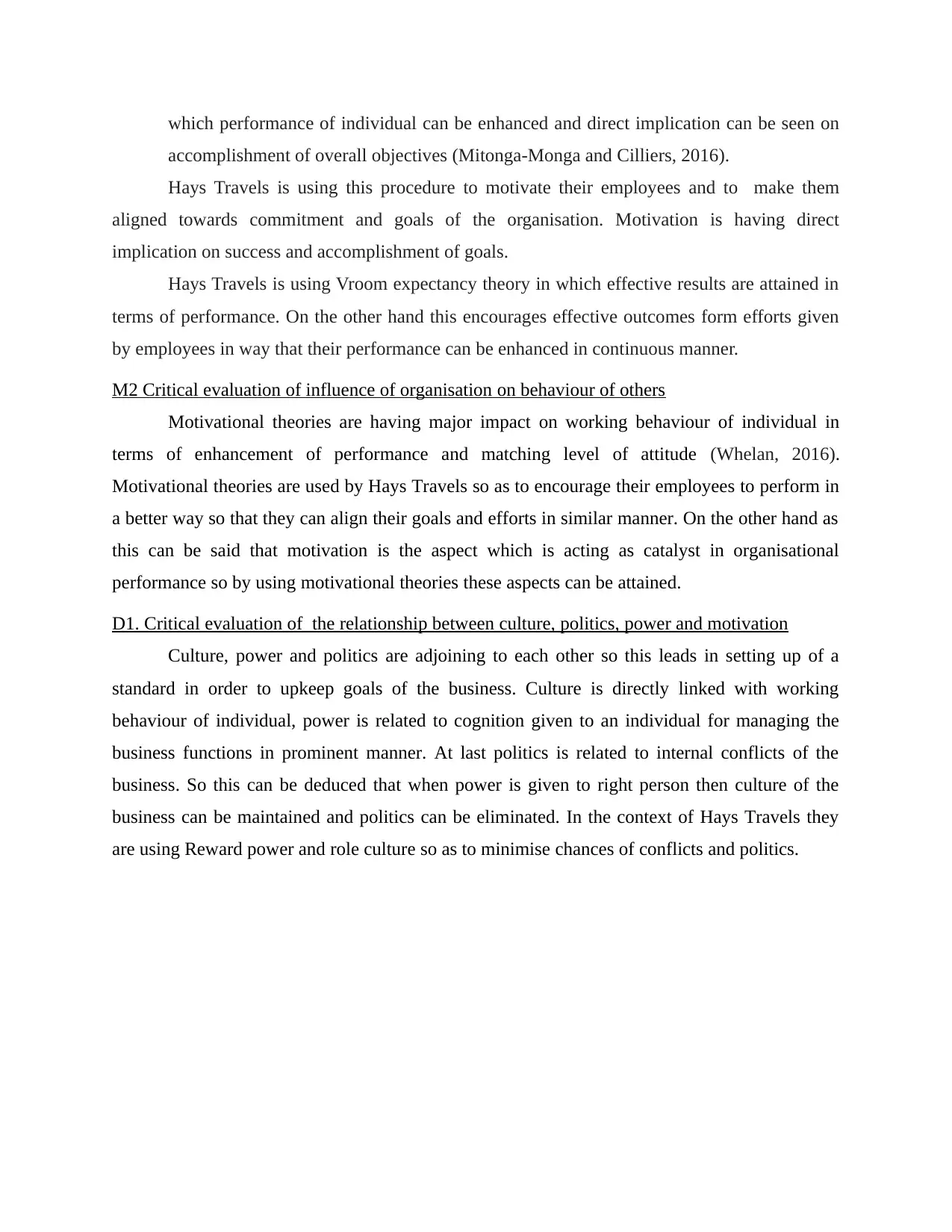
which performance of individual can be enhanced and direct implication can be seen on
accomplishment of overall objectives (Mitonga-Monga and Cilliers, 2016).
Hays Travels is using this procedure to motivate their employees and to make them
aligned towards commitment and goals of the organisation. Motivation is having direct
implication on success and accomplishment of goals.
Hays Travels is using Vroom expectancy theory in which effective results are attained in
terms of performance. On the other hand this encourages effective outcomes form efforts given
by employees in way that their performance can be enhanced in continuous manner.
M2 Critical evaluation of influence of organisation on behaviour of others
Motivational theories are having major impact on working behaviour of individual in
terms of enhancement of performance and matching level of attitude (Whelan, 2016).
Motivational theories are used by Hays Travels so as to encourage their employees to perform in
a better way so that they can align their goals and efforts in similar manner. On the other hand as
this can be said that motivation is the aspect which is acting as catalyst in organisational
performance so by using motivational theories these aspects can be attained.
D1. Critical evaluation of the relationship between culture, politics, power and motivation
Culture, power and politics are adjoining to each other so this leads in setting up of a
standard in order to upkeep goals of the business. Culture is directly linked with working
behaviour of individual, power is related to cognition given to an individual for managing the
business functions in prominent manner. At last politics is related to internal conflicts of the
business. So this can be deduced that when power is given to right person then culture of the
business can be maintained and politics can be eliminated. In the context of Hays Travels they
are using Reward power and role culture so as to minimise chances of conflicts and politics.
accomplishment of overall objectives (Mitonga-Monga and Cilliers, 2016).
Hays Travels is using this procedure to motivate their employees and to make them
aligned towards commitment and goals of the organisation. Motivation is having direct
implication on success and accomplishment of goals.
Hays Travels is using Vroom expectancy theory in which effective results are attained in
terms of performance. On the other hand this encourages effective outcomes form efforts given
by employees in way that their performance can be enhanced in continuous manner.
M2 Critical evaluation of influence of organisation on behaviour of others
Motivational theories are having major impact on working behaviour of individual in
terms of enhancement of performance and matching level of attitude (Whelan, 2016).
Motivational theories are used by Hays Travels so as to encourage their employees to perform in
a better way so that they can align their goals and efforts in similar manner. On the other hand as
this can be said that motivation is the aspect which is acting as catalyst in organisational
performance so by using motivational theories these aspects can be attained.
D1. Critical evaluation of the relationship between culture, politics, power and motivation
Culture, power and politics are adjoining to each other so this leads in setting up of a
standard in order to upkeep goals of the business. Culture is directly linked with working
behaviour of individual, power is related to cognition given to an individual for managing the
business functions in prominent manner. At last politics is related to internal conflicts of the
business. So this can be deduced that when power is given to right person then culture of the
business can be maintained and politics can be eliminated. In the context of Hays Travels they
are using Reward power and role culture so as to minimise chances of conflicts and politics.
⊘ This is a preview!⊘
Do you want full access?
Subscribe today to unlock all pages.

Trusted by 1+ million students worldwide

Paraphrase This Document
Need a fresh take? Get an instant paraphrase of this document with our AI Paraphraser

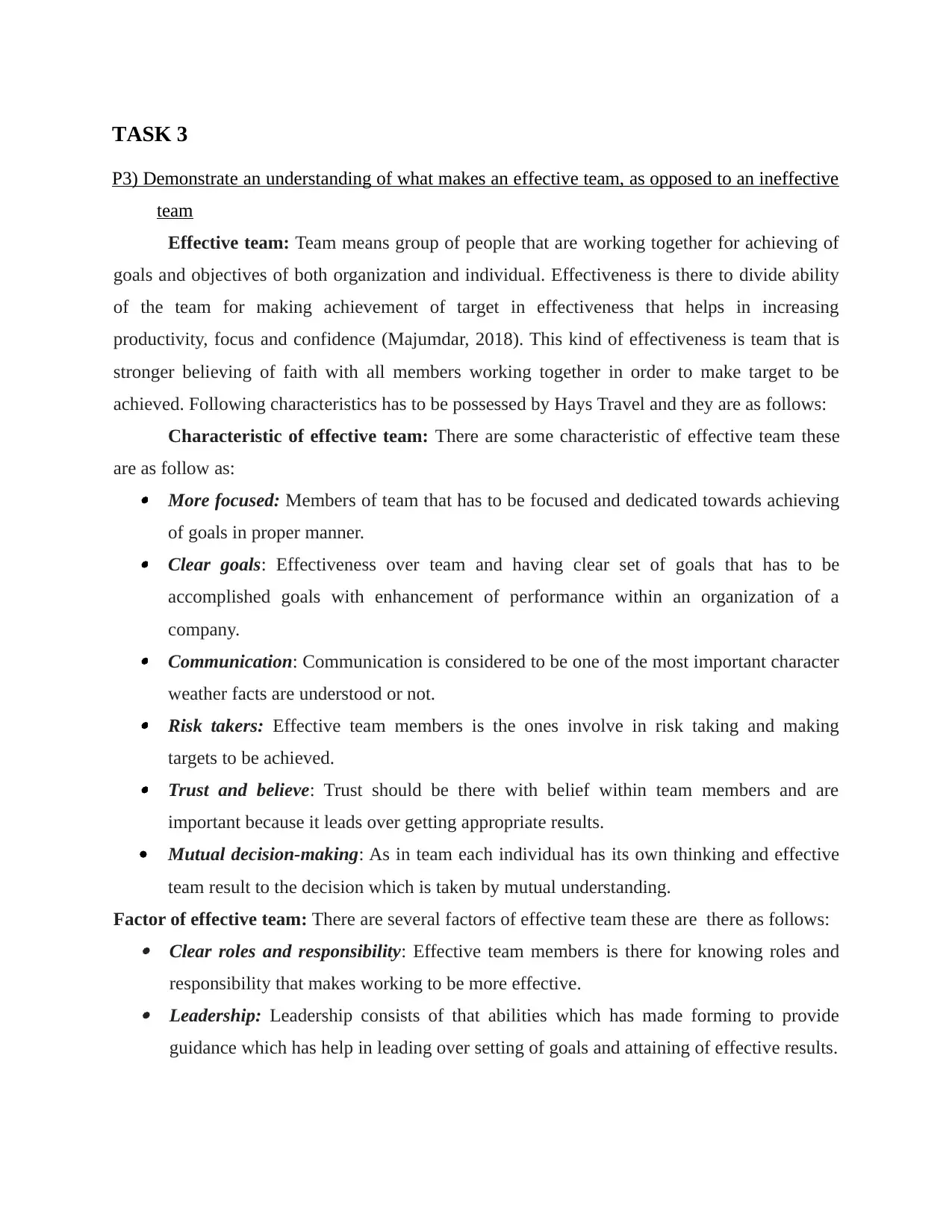
TASK 3
P3) Demonstrate an understanding of what makes an effective team, as opposed to an ineffective
team
Effective team: Team means group of people that are working together for achieving of
goals and objectives of both organization and individual. Effectiveness is there to divide ability
of the team for making achievement of target in effectiveness that helps in increasing
productivity, focus and confidence (Majumdar, 2018). This kind of effectiveness is team that is
stronger believing of faith with all members working together in order to make target to be
achieved. Following characteristics has to be possessed by Hays Travel and they are as follows:
Characteristic of effective team: There are some characteristic of effective team these
are as follow as: More focused: Members of team that has to be focused and dedicated towards achieving
of goals in proper manner. Clear goals: Effectiveness over team and having clear set of goals that has to be
accomplished goals with enhancement of performance within an organization of a
company. Communication: Communication is considered to be one of the most important character
weather facts are understood or not. Risk takers: Effective team members is the ones involve in risk taking and making
targets to be achieved. Trust and believe: Trust should be there with belief within team members and are
important because it leads over getting appropriate results.
Mutual decision-making: As in team each individual has its own thinking and effective
team result to the decision which is taken by mutual understanding.
Factor of effective team: There are several factors of effective team these are there as follows: Clear roles and responsibility: Effective team members is there for knowing roles and
responsibility that makes working to be more effective. Leadership: Leadership consists of that abilities which has made forming to provide
guidance which has help in leading over setting of goals and attaining of effective results.
P3) Demonstrate an understanding of what makes an effective team, as opposed to an ineffective
team
Effective team: Team means group of people that are working together for achieving of
goals and objectives of both organization and individual. Effectiveness is there to divide ability
of the team for making achievement of target in effectiveness that helps in increasing
productivity, focus and confidence (Majumdar, 2018). This kind of effectiveness is team that is
stronger believing of faith with all members working together in order to make target to be
achieved. Following characteristics has to be possessed by Hays Travel and they are as follows:
Characteristic of effective team: There are some characteristic of effective team these
are as follow as: More focused: Members of team that has to be focused and dedicated towards achieving
of goals in proper manner. Clear goals: Effectiveness over team and having clear set of goals that has to be
accomplished goals with enhancement of performance within an organization of a
company. Communication: Communication is considered to be one of the most important character
weather facts are understood or not. Risk takers: Effective team members is the ones involve in risk taking and making
targets to be achieved. Trust and believe: Trust should be there with belief within team members and are
important because it leads over getting appropriate results.
Mutual decision-making: As in team each individual has its own thinking and effective
team result to the decision which is taken by mutual understanding.
Factor of effective team: There are several factors of effective team these are there as follows: Clear roles and responsibility: Effective team members is there for knowing roles and
responsibility that makes working to be more effective. Leadership: Leadership consists of that abilities which has made forming to provide
guidance which has help in leading over setting of goals and attaining of effective results.
⊘ This is a preview!⊘
Do you want full access?
Subscribe today to unlock all pages.

Trusted by 1+ million students worldwide
1 out of 18
Related Documents
Your All-in-One AI-Powered Toolkit for Academic Success.
+13062052269
info@desklib.com
Available 24*7 on WhatsApp / Email
![[object Object]](/_next/static/media/star-bottom.7253800d.svg)
Unlock your academic potential
Copyright © 2020–2026 A2Z Services. All Rights Reserved. Developed and managed by ZUCOL.




